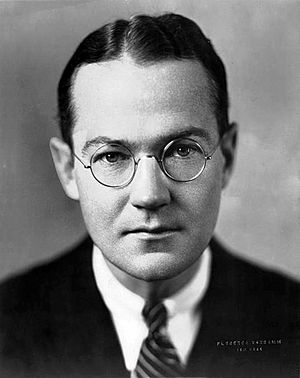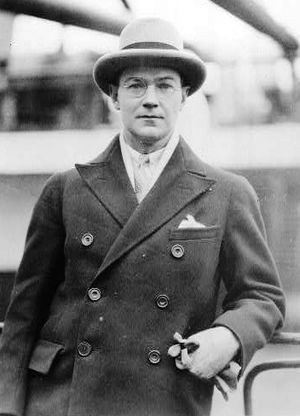Philip Barry facts for kids
Quick facts for kids
Philip Barry
|
|
|---|---|

Barry in 1928
|
|
| Born | June 18, 1896 Rochester, New York, U.S. |
| Died | December 3, 1949 (aged 53) New York City, U.S. |
| Occupation | Dramatist |
| Nationality | American |
| Genre | Theatre |
Philip Jerome Quinn Barry (born June 18, 1896 – died December 3, 1949) was an American writer who created plays. He is most famous for his plays Holiday (1928) and The Philadelphia Story (1939). Both of these plays were turned into popular movies starring Katharine Hepburn and Cary Grant.
Contents
About Philip Barry
His Early Life
Philip Barry was born in Rochester, New York, on June 18, 1896. His parents were James Corbett Barry and Mary Agnes Quinn Barry. Philip's father passed away when Philip was only one year old. His oldest brother, Edmund, who was 16, left school to help with the family's marble and tile business. He became like a father to young Philip.
When Philip was 14, he found out he was supposed to get a share of his father's business. This caused some family disagreements. He later said he never wanted the money. He eventually gave his share of the business to his mother and brothers.
Philip had poor eyesight, so he could not join the military during World War I. Instead, he worked at the U.S. Embassy in London. He helped decode secret messages. After the war, he went back to college at Yale University. He studied writing there and earned his degree.
His family wanted him to return to Rochester and join the family business. But Philip was determined to become a writer. He decided to study playwriting at Harvard University. He joined a famous class called "47 Workshop," taught by George Pierce Baker. Many other famous writers, like Eugene O'Neill, also studied in this class.
Becoming a Playwright
Philip Barry started writing very young. When he was nine, a story he wrote called Tab the Cat was published in a Rochester newspaper. At Yale, he wrote poems and short stories. He also worked for the Yale Literary Magazine.
In 1919, a one-act play he wrote called Autonomy was performed. By the time he joined the Harvard playwriting class, he was spending all his time writing plays. His first full-length play for the class was A Punch for Judy. This play was taken on tour to several cities, but it did not get produced in New York.
While still in college, Philip got engaged to Ellen Semple. He wanted to become a successful playwright before getting married. He wrote a play called The Jilts. This play was about his worries that marriage might stop him from being an artist. The play won an award in 1922. Philip and Ellen got married on July 15, 1922. Their first son, Philip Semple Barry, was born the next year.
Broadway Successes
The Jilts was renamed You and I. It opened on Broadway on February 19, 1923. The play was a big hit with both critics and audiences. This launched Philip Barry's career on Broadway. The play ran for 170 performances. It was later included in a book series about the "Best Plays" of the year.
Barry's next play, The Youngest, was produced the following year. It was not as successful as You and I. His third Broadway play, In a Garden (1925), showed his unique style. He often wrote comedies that seemed light but had deeper meanings.
In 1926, his play White Wings was produced. It was not successful and closed after only 27 performances. A year later, in 1927, Philip and his family moved to France. He started working on two new plays there. One play, John, was not a success. It was about John the Baptist and only lasted a few days.
However, his other play, a comedy called Paris Bound, opened a few weeks later. It was a major hit and ran for 234 performances in New York. This play brought him a lot of money from royalties for many years.
Famous Plays and Movies
Holiday (1928) was another very popular comedy. It ran for 230 performances. Many people consider it one of Barry's best plays. It shows a wealthy American family and how they deal with new ideas. The play was made into a movie twice. The 1938 film version starred Katharine Hepburn and Cary Grant. Hepburn played the older daughter of a rich businessman. Grant played a charming man who didn't want to spend his whole life making money. Holiday has been performed on Broadway many times since.
In 1931, Tomorrow and Tomorrow was produced. The rights to make it into a movie were sold for a large amount of money.
Even though he was known for his funny plays about rich people, Philip Barry also wrote serious dramas. Many of these plays were about religious topics. For example, his 1927 play John is a story from the New Testament. His 1938 play Here Come the Clowns was about fighting evil. The Joyous Season (1934) showed a strong nun who dedicated her life to her faith.
Barry's most famous play is The Philadelphia Story (1939). It was made into a very popular movie in 1940. The movie starred Katharine Hepburn, Cary Grant, and James Stewart. Katharine Hepburn was a close friend of Barry. She had acted in the play on Broadway. She even bought the movie rights herself. The movie helped her career in Hollywood. The film was later remade as High Society in 1956. That movie starred Frank Sinatra, Bing Crosby, and Grace Kelly. The Philadelphia Story play ran for 417 performances on Broadway.
Philip Barry passed away from a heart attack in 1949. He was 53 years old. Many actresses, like Katharine Hepburn, loved his plays. They felt he wrote wonderful roles for women.
Philip Barry's Plays
- Autonomy (1919)
- A Punch for Judy (1921)
- You and I (1923), filmed in 1931 as The Bargain
- The Youngest (1924)
- In a Garden (1925)
- White Wings (1926)
- John (1927)
- Paris Bound (1927), filmed in 1929
- Holiday (1928), filmed in 1930 and in 1938
- Cock Robin (with Elmer Rice) (1928)
- Hotel Universe (1930)
- Tomorrow and Tomorrow (1931), filmed in 1932
- The Animal Kingdom (1932) filmed in 1932 and as One More Tomorrow in 1946
- The Joyous Season (1934)
- Bright Star (1935)
- Spring Dance (1936), filmed as Spring Madness in 1938
- Here Come the Clowns (1938)
- The Philadelphia Story (1939), filmed in 1940 and as High Society in 1956
- Liberty Jones (1941)
- Without Love (1942), filmed in 1945
- Foolish Notion (1945)
- My Name is Aquilon (1949)
- Second Threshold (1951), finished by Robert Sherwood


